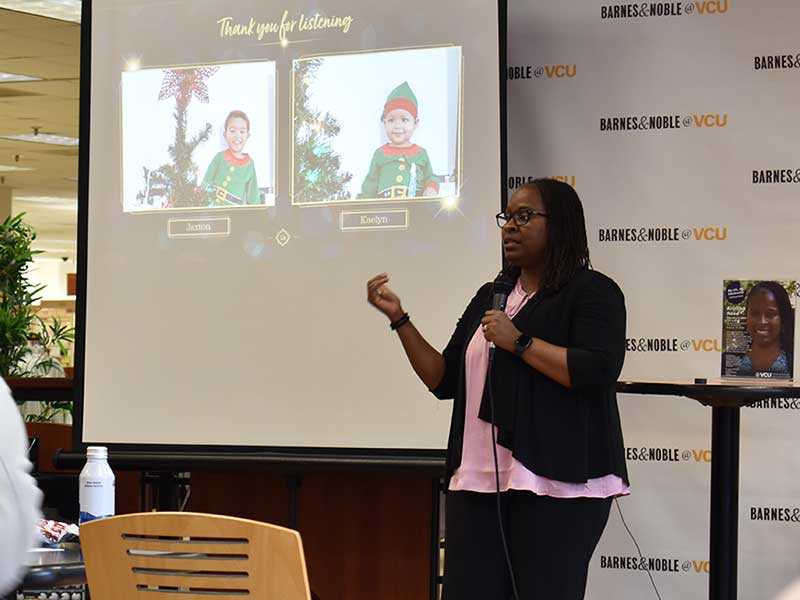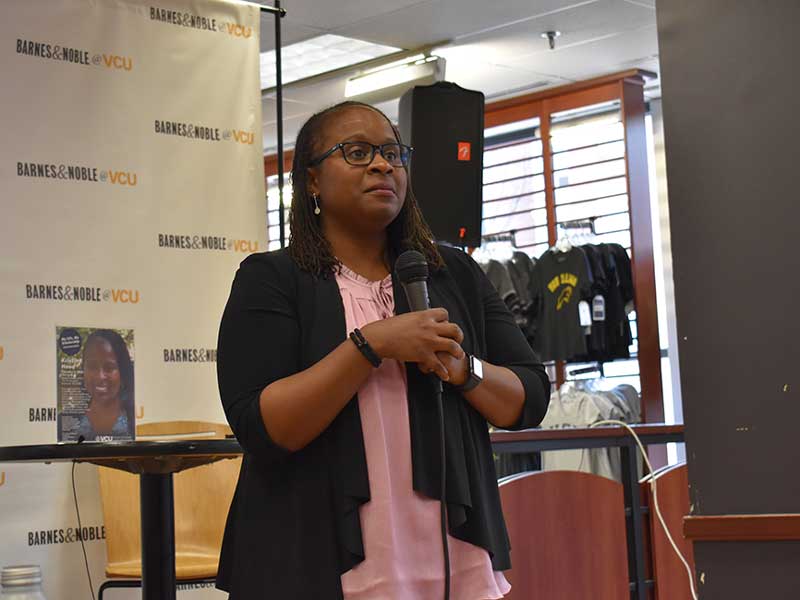She grew up in a tight-knit family. Now, VCU researcher Kristina Hood is turning her attention to helping women facing challenges in expanding their own families.
“I met many, many women who’ve experienced difficulty having kids as well as loss throughout that journey. The heartbreaking one-on-one conversations I have had with individuals who experience loss – although we don’t talk about it outwardly – it’s kind of like a secret club that no one wants to belong to,” Hood said.
Hood is an assistant professor in the VCU Psychology Department and one of the original scholars in the Culture, Race and Health Transdisciplinary Core at the Institute for Inclusion, Inquiry and Innovation (iCubed). She seeks to help people who have experienced fertility challenges or loss of a pregnancy.
Hood shared her focus during a recent lecture as part of the My Life, My Scholarship Symposium Series. The monthly series features scholars from iCubed and the Hubert H. Humphrey Fellowship program examining how their lived experiences have impacted their research and scholarly interests.
The story she shared included two distinct parts. The first was what she learned about herself and her potential while growing up as the third of four girls in a loving family. The second was how the people she met along her academic journey helped her understand who she could help as a community-focused social psychology researcher.
Growing up in a bubble
Hood grew up in what she calls “a bubble” – a planned community in Columbia, Maryland, where everything she and her family needed was nearby her home.
“Growing up, I didn’t really understand the ‘isms’ that I study today – racism and sexism – that are out there. I didn’t really feel those growing up in the first couple of years of my life,” Hood said.
She says that while growing up, her mom taught her to never let someone else’s opinion determine what you can achieve.
"I vowed…that rural health equity will always be a part of what I do."
“It’s easy to get caught up in what everybody else thinks about you. It’s not what they believe about my ability. It’s what I believe about my ability and to really focus on that in order to achieve my goals,” Hood says.
Hood’s father was an instructor, often teaching community college and university courses in the evening in addition to working a fulltime day job. Hood sometimes spent his class sessions sitting in the back of the room, grading papers for him.
“My dad also was one of the most fearless people I have ever met. He always went by the belief that if you feel that what you’re doing is right, then that is what you need to go forward,” Hood said.
Hood’s father also taught her how to cook. From the tender age of three, she would balance on a step stool, working the stovetop under his careful supervision. She says the kitchen remains her sanctuary to this day.
“Food isn’t just nurturing the body for me, it is the way that I express myself. So when I’m mad, I cook. When I’m frustrated, I cook. Throughout graduate school, I cooked every day. My cohort would know that I had a bad day because I told them to come over and there would be a five course meal spread out,” Hood said.
Hood discussed her three sisters, each with distinctive personalities and offering unique influences on her life. She said those differences in many ways inspire her research.
“Their experiences are different even as we’re in the same house. And that we can share commonalities but still experience something differently. That has been so important to me and taking that into research knowing that the way that I grew up and the way that I view things are not going to be the same as everybody else in the room,” Hood says.
“A whole other perspective”
After completing her bachelor degree program, Hood’s graduate school experience took a circuitous route, resulting in her earning three masters degrees. Hood said her lack of research experience left her searching for a focus.
An interest in criminal science inspired her to pursue that direction. But a lightbulb went off for her when she participated in a sociology project in rural southern Virginia to help communities create youth programming.
“At that point, I didn’t realize how research and community work could blend together. I really thought that I could do only one or the other. So, my service interests were very different from my research interests because I didn’t know you could combine them. I didn’t know that you could do more,” she said.
Soon after, she met VCU psychologist Faye Belgrave and worked with her on an internship in Kenya.
“I went to Kenya thinking I was going to do research on ethnic identity and the intersection with the criminal justice system. I came back as an HIV researcher,” she said.
Be willing to serve the community

A relocation to Starkville, Mississippi transformed her into a community health researcher. Living in a segregated town, where residents lacked transportation options, did not trust the local emergency room and had little access to medical specialists sharply contrasted with that “bubble” she grew up in.
“My passion for rural health came from there. Living it gave me a whole other perspective that I never learned in the textbooks. It changes your perspective on what it’s like to be here in the U.S. and to be privileged in the U.S.,” she said.
One lady Hood had befriended died from an infection after contracting cancer but lacked the medical insurance needed to continue treatments for it.
“I vowed to her that rural health equity will always be a part of what I do,” Hood said. “She should still be here with her grandchildren.”
“These humans are my everything.”
Hood has been thinking a great deal lately about being with children, and not just because she and her husband now have two of their own, ages three and one.
“These humans are my everything,” she said, beaming over the images of young, smiling faces.
Hood’s journey to motherhood was arduous. She faced loss along the way. And the lack of resources and support she experienced in those dark moments inspired her to do something about it.
Hood wants to work to end the stigma around fertility challenges and the experience of losing a pregnancy. She pursues that work knowing that it will be hard, but she feels compelled to do it.
“As a member of that community, I would never want to take advantage of those who sit in that space with me. But I also don’t want to assume because I am a member of that community that I know what their experience has been. Part of this new phase right now is understanding learning and doing a bit more to really be sure that I can do it ethically, morally, and that it feels good to both me and the community that I hope to serve,” Hood said.
That represents a shift from the HIV prevention work that has been the focus of much of Hood’s current research. She said she’s counseling herself through such a transition the same way she would advise her students, leaning on the lessons her parents taught her.
“Walk your purpose. Know what you want and keep moving towards it. It is a long road,” Hood said. “There’s a lot of setbacks. We put so much pressure and expectation on ourselves. Honor the time. Honor the journey. Honor the experience because everything I did, I learned something from it and it might not have been easy but I wouldn’t take it back. You’ll get there.”
This feature was originally published on the VCU Office of Institutional Equity, Effectiveness and Success blog.
